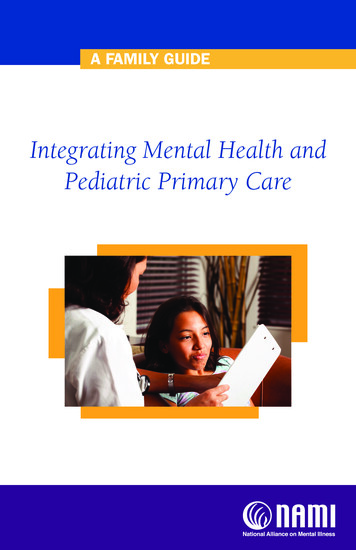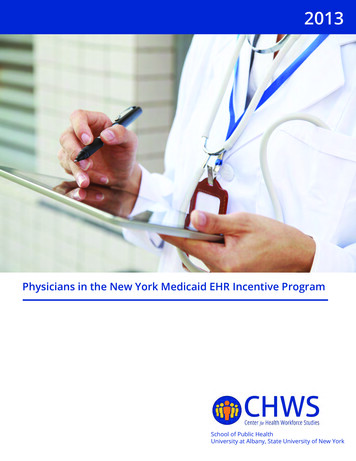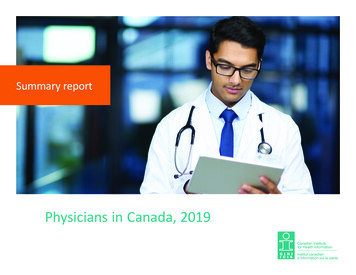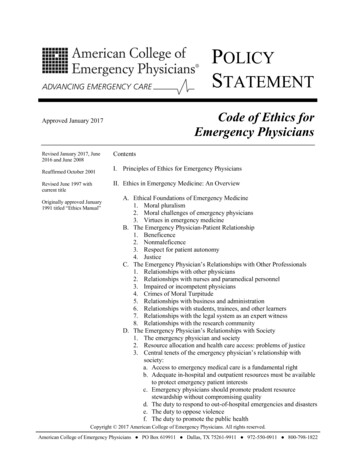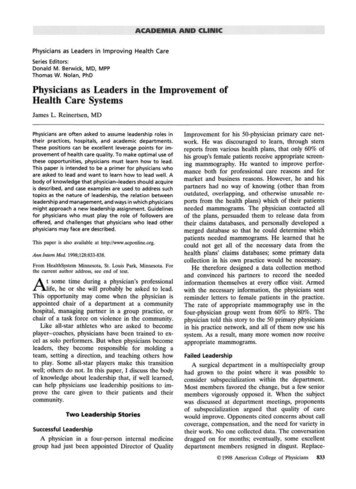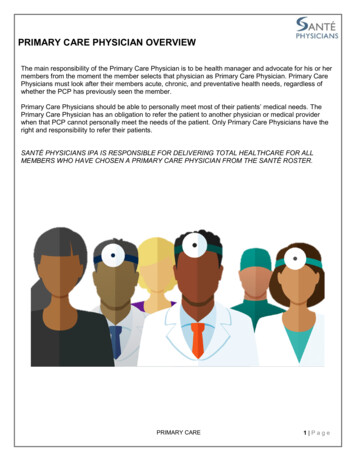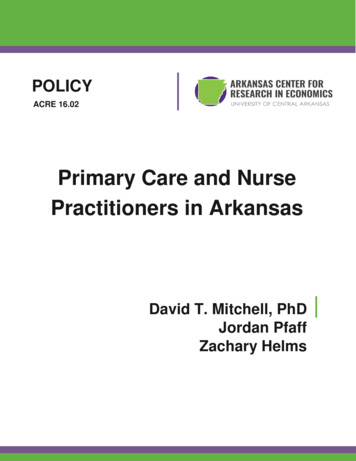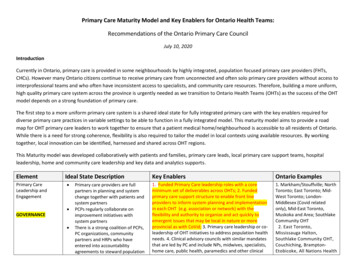
Transcription
Online ISSN : 2249-4618Print ISSN : 0975-5888DOI : 10.17406/GJMRAPrimary Care PhysiciansPerceptions of HealthcareHealth Care Plan SelectionEffect of Gravitational StressVOLUME 16 ISSUE 1 VERSION 1.0
Global Journal of Medical Research: kInterdisciplinary
Global Journal of Medical Research: kINTERDISCIPLINARYVolume 16 Issue 1 (Ver. 1.0)Open Association of Research Society
Global Journal of MedicalResearch . 2016.All rights reserved.This is a special issue published in version 1.0of “Global Journal of Medical Research.” ByGlobal Journals Inc.All articles are open access articles distributedunder “Global Journal of Medical Research”Reading License, which permits restricted use.Entire contents are copyright by of “GlobalJournal of Medical Research” unlessotherwise noted on specific articles.No part of this publication may be reproducedor transmitted in any form or by any means,electronic or mechanical, includingphotocopy, recording, or any informationstorage and retrieval system, without writtenpermission.The opinions and statements made in thisbook are those of the authors concerned.Ultraculture has not verified and neitherconfirms nor denies any of the foregoing andno warranty or fitness is implied.Engage with the contents herein at your ownrisk.The use of this journal, and the terms andconditions for our providing information, isgoverned by our Disclaimer, Terms andConditions and Privacy Policy given on ourZHEVLWH id-1463/By referring / using / reading / any type ofassociation / referencing this journal, thissignifies and you acknowledge that you haveread them and that you accept and will bebound by the terms thereof.All information, journals, this journal,activities undertaken, materials, services andour website, terms and conditions, privacypolicy, and this journal is subject to changeanytime without any prior notice.Incorporation No.: 0423089License No.: 42125/022010/1186Registration No.: 430374Import-Export Code: 1109007027Employer Identification Number (EIN):USA Tax ID: 98-0673427Global Journals Inc.(A Delaware USA Incorporation with “Good Standing”; Reg. Number: 0423089)Sponsors: Open Association of Research SocietyOpen Scientific StandardsPublisher’s Headquarters officeGlobal Journals Headquarters301st Edgewater Place Suite, 100 Edgewater Dr.-Pl,Wakefield MASSACHUSETTS, Pin: 01880,United States of AmericaUSA Toll Free: 001-888-839-7392USA Toll Free Fax: 001-888-839-7392Offset TypesettingGlobal Journals Incorporated2nd, Lansdowne, Lansdowne Rd., Croydon-Surrey,Pin: CR9 2ER, United KingdomPackaging & Continental DispatchingGlobal JournalsE-3130 Sudama Nagar, Near Gopur Square,Indore, M.P., Pin: 452009, IndiaFind a correspondence nodal officer near youTo find nodal officer of your country, pleaseemail us at local@globaljournals.orgeContactsPress Inquiries: press@globaljournals.orgInvestor Inquiries: investors@globaljournals.orgTechnical Support: technology@globaljournals.orgMedia & Releases: media@globaljournals.orgPricing (Including by Air Parcel Charges):For Authors:22 USD (B/W) & 50 USD (Color)Yearly Subscription (Personal & Institutional):200 USD (B/W) & 250 USD (Color)
Integrated Editorial Board(Computer Science, Engineering, Medical, Management, NaturalScience, Social Science)John A. Hamilton,"Drew" Jr.,Ph.D., Professor, ManagementComputer Science and SoftwareEngineeringDirector, Information AssuranceLaboratoryAuburn UniversityDr. Henry HexmoorIEEE senior member since 2004Ph.D. Computer Science, University atBuffaloDepartment of Computer ScienceSouthern Illinois University at CarbondaleDr. Osman Balci, ProfessorDepartment of Computer ScienceVirginia Tech, Virginia UniversityPh.D. and M.S. Syracuse University,Syracuse, New YorkM.S. and B.S. Bogazici University,Istanbul, TurkeyYogita BajpaiM.Sc. (Computer Science), FICCTU.S.A. Email:yogita@computerresearch.orgDr. T. David A. ForbesAssociate Professor and RangeNutritionistPh.D. Edinburgh University - AnimalNutritionM.S. Aberdeen University - AnimalNutritionB.A. University of Dublin- ZoologyDr. Wenying FengProfessor, Department of Computing &Information SystemsDepartment of MathematicsTrent University, Peterborough,ON Canada K9J 7B8Dr. Thomas WischgollComputer Science and Engineering,Wright State University, Dayton, OhioB.S., M.S., Ph.D.(University of Kaiserslautern)Dr. Abdurrahman ArslanyilmazComputer Science & Information SystemsDepartmentYoungstown State UniversityPh.D., Texas A&M UniversityUniversity of Missouri, ColumbiaGazi University, TurkeyDr. Xiaohong HeProfessor of International BusinessUniversity of QuinnipiacBS, Jilin Institute of Technology; MA, MS,PhD,. (University of Texas-Dallas)Burcin Becerik-GerberUniversity of Southern CaliforniaPh.D. in Civil EngineeringDDes from Harvard UniversityM.S. from University of California, Berkeley& Istanbul University
Dr. Bart LambrechtDirector of Research in Accounting andFinanceProfessor of FinanceLancaster University Management SchoolBA (Antwerp); MPhil, MA, PhD(Cambridge)Dr. Carlos García PontAssociate Professor of MarketingIESE Business School, University ofNavarraDoctor of Philosophy (Management),Massachusetts Institute of Technology(MIT)Master in Business Administration, IESE,University of NavarraDegree in Industrial Engineering,Universitat Politècnica de CatalunyaDr. Fotini LabropuluMathematics - Luther CollegeUniversity of ReginaPh.D., M.Sc. inMathematicsB.A. (Honors) in MathematicsUniversity of WindsoDr. Söhnke M. BartramDepartment of Accounting andFinanceLancaster University ManagementSchoolPh.D. (WHU Koblenz)MBA/BBA (University of Saarbrücken)Dr. Miguel Angel AriñoProfessor of Decision SciencesIESE Business SchoolBarcelona, Spain (Universidad de Navarra)CEIBS (China Europe International BusinessSchool).Beijing, Shanghai and ShenzhenPh.D. in MathematicsUniversity of BarcelonaBA in Mathematics (Licenciatura)University of BarcelonaPhilip G. MoscosoTechnology and Operations ManagementIESE Business School, University of NavarraPh.D in Industrial Engineering andManagement, ETH ZurichM.Sc. in Chemical Engineering, ETH ZurichDr. Lynn LimReader in Business and MarketingRoehampton University, LondonBCom, PGDip, MBA (Distinction), PhD,FHEADr. Sanjay Dixit, M.D.Director, EP Laboratories, Philadelphia VAMedical CenterCardiovascular Medicine - CardiacArrhythmiaUniv of Penn School of MedicineDr. Mihaly MezeiASSOCIATE PROFESSORDepartment of Structural and ChemicalBiology, Mount Sinai School of MedicalCenterPh.D., Etvs Lornd UniversityPostdoctoral Training,New York UniversityDr. Han-Xiang DengMD., Ph.DAssociate Professor and ResearchDepartment Division of NeuromuscularMedicineDavee Department of Neurology and ClinicalNeuroscienceNorthwestern UniversityFeinberg School of Medicine
Dr. Pina C. SanelliAssociate Professor of Public HealthWeill Cornell Medical CollegeAssociate Attending RadiologistNewYork-Presbyterian HospitalMRI, MRA, CT, and CTANeuroradiology and DiagnosticRadiologyM.D., State University of New York atBuffalo,School of Medicine andBiomedical SciencesDr. Roberto SanchezAssociate ProfessorDepartment of Structural and ChemicalBiologyMount Sinai School of MedicinePh.D., The Rockefeller UniversityDr. Wen-Yih SunProfessor of Earth and AtmosphericSciencesPurdue University DirectorNational Center for Typhoon andFlooding Research, TaiwanUniversity Chair ProfessorDepartment of Atmospheric Sciences,National Central University, Chung-Li,TaiwanUniversity Chair ProfessorInstitute of Environmental Engineering,National Chiao Tung University, Hsinchu, Taiwan.Ph.D., MS The University ofChicago, Geophysical SciencesBS National Taiwan University,Atmospheric SciencesAssociate Professor of RadiologyDr. Michael R. RudnickM.D., FACPAssociate Professor of MedicineChief, Renal Electrolyte andHypertension Division (PMC)Penn Medicine, University ofPennsylvaniaPresbyterian Medical Center,PhiladelphiaNephrology and Internal MedicineCertified by the American Board ofInternal MedicineDr. Bassey Benjamin EsuB.Sc. Marketing; MBA Marketing; Ph.DMarketingLecturer, Department of Marketing,University of CalabarTourism Consultant, Cross River StateTourism Development DepartmentCo-ordinator , Sustainable TourismInitiative, Calabar, NigeriaDr. Aziz M. Barbar, Ph.D.IEEE Senior MemberChairperson, Department of ComputerScienceAUST - American University of Science &TechnologyAlfred Naccash Avenue – Ashrafieh
President Editor (HON.)Dr. George Perry, (Neuroscientist)Dean and Professor, College of SciencesDenham Harman Research Award (American Aging Association)ISI Highly Cited Researcher, Iberoamerican Molecular Biology OrganizationAAAS Fellow, Correspondent Member of Spanish Royal Academy of SciencesUniversity of Texas at San AntonioPostdoctoral Fellow (Department of Cell Biology)Baylor College of MedicineHouston, Texas, United StatesChief Author (HON.)Dr. R.K. DixitM.Sc., Ph.D., FICCTChief Author, IndiaEmail: authorind@computerresearch.orgDean & Editor-in-Chief (HON.)Vivek Dubey(HON.)MS (Industrial Engineering),MS (Mechanical Engineering)University of Wisconsin, FICCTEditor-in-Chief, USAeditorusa@computerresearch.orgSangita DixitM.Sc., FICCTDean & Chancellor (Asia Pacific)deanind@computerresearch.orgSuyash Dixit(B.E., Computer Science Engineering), FICCTTPresident, Web Administration andDevelopment , CEO at IOSRDCOO at GAOR & OSSEr. Suyog Dixit(M. Tech), BE (HONS. in CSE), FICCTSAP Certified ConsultantCEO at IOSRD, GAOR & OSSTechnical Dean, Global Journals Inc. (US)Website: www.suyogdixit.comEmail: suyog@suyogdixit.comPritesh Rajvaidya(MS) Computer Science DepartmentCalifornia State UniversityBE (Computer Science), FICCTTechnical Dean, USAEmail: pritesh@computerresearch.orgLuis GalárragaJ!Research Project LeaderSaarbrücken, Germany
Contents of the Issuei.ii.iii.iv.Copyright NoticeEditorial Board MembersChief Author and DeanContents of the Issue1.Health Care Plan Selection: Medicare Beneficiaries and the Different FactorsTaken into Considertation. 1-3Interprofessional Working: Perceptions of Healthcare Professionals inNepalese Hospitals. 5-11How Important are Primary Care Physicians and Specialists when Choosinga Medicare Plan. 13-14Experiences of Implementers and Decision-Makers with Maternal and ChildHealth Demand Side Targeting Mechanisms: A Case Study of NationalHealth Insurance Fund Pro-Poor Scheme in Rungwe fect of Gravitational Stress and Exercises on Bone Demineralization &Renal Complication in Paraplegics & Quadriplegics. 25-29FellowsAuxiliary MembershipsProcess of Submission of Research PaperPreferred Author GuidelinesIndex
Global Journal of Medical Research: KInterdisciplinaryVolume 16 Issue 1 Version 1.0 Year 2016Type: Double Blind Peer Reviewed International Research JournalPublisher: Global Journals Inc. (USA)Online ISSN: 2249-4618 & Print ISSN: 0975-5888Health Care Plan Selection: Medicare Beneficiaries and the DifferentFactors Taken into ConsidertationBy Michael Castro, D.B.A.Abstract- The purpose of this paper was to obtain an enhanced understanding on the mainfactors that Medicare beneficiaries take into consideration before selecting a plan. This objectivewas fulfilled by interviewing a total of 16 Medicare beneficiaries from two south Florida counties.The participants were divided equally, 8 participants from Miami- Dade County and another 8from Broward County. The researcher evaluated the differences between the populations fromMiami-Dade County and Broward County participants to determine if there were any similarities.The researcher utilized one research question in order to fulfill the objective of the paper. Bycomparing the responses from the participants from both counties, health care plans that serveboth counties can gain understanding of the differences between the populations.GJMR-K Classification: NLMC Code: WT heDifferentFactorsTakenintoConsidertationStrictly as per the compliance and regulations of: 2016. Michael Castro, D.B.A. This is a research/review paper, distributed under the terms of the Creative Commons AttributionNoncommercial 3.0 Unported License http://creativecommons.org/licenses/by-nc/3.0/), permitting all non-commercial use,distribution, and reproduction in any medium, provided the original work is properly cited.
Health Care Plan Selection: MedicareBeneficiaries and the Different Factors Takeninto ConsidertationI. What are the Different Factors thatTMedicare Beneficiaries Take intoAccount when Selecting a MedicarePlan?he Medicare beneficiaries in South Florida valueand demand different benefits within the healthcare plan (in which they are enrolled) dependingon their health status. The Medicare beneficiaries inBroward County and Miami-Dade County are in need ofbenefits that these health care plans offer. There areseveral benefits that the senior population may highlyvalue, such as hospital coverage, prescription drugcoverage, primary dental benefits, vision benefits,transportation benefits, and over-the-counter (OTC)benefits. Health care plans that lack certain benefits leadto members to dis-enroll from the health care plan whenopen enrollment begins (Mobley et al., 2007).II.Medicare Plan Selection Factorsamong Broward County MedicareBeneficiariesBroward participants valued dental, vision,prescription drug coverage, and their primary carephysician. Five of the eight participants from BrowardCounty (4 males and 1 female) had changed plans dueto a lack of dental, vision, prescription drug coverage,and/or because their primary care physician was nolonger contracted to practice as part of the plan. TheseAuthor: e-mail: michaelcastro333@gmail.comIII. Medicare Plan Selection Factorsamong Miami-Dade County MedicareBeneficiariesFive of the eight participants from Miami-DadeCounty (3 females and 2 males) had also changedhealth care plans. These Medicare beneficiarieschanged health care plans due to a lack in prescriptiondrug coverage/copays and because their primary carephysician was no longer contracted to practice underthe Plan. These results suggested that females in MiamiDade County expect their health care plans to providesuch benefits, in contrast to their male counterparts. TheMiami-Dade County beneficiaries also valuedprescription drug coverage and the copays to thosedrugs, as well as their primary care physician the most.If a health care plan did not offer such benefits, theMedicare beneficiaries would change plans and pursuea plan that provides such benefits. The other threeparticipants changed health care plans for otherreasons.IV. Comparison of Medicare PlanSelection Factors between BrowardCounty and Miami-Dade CountyMedicare BeneficiariesBoth samples of Medicare beneficiariesrevealed similarities and differences in the variousfactors they evaluate before enrolling into a health careplan. Differences were as follows. The Browardpopulation valued dental, vision, prescription drugcoverage, and their primary care physician the most.The Miami-Dade population valued prescription drugcoverage/high copays and their primary care physicianthe most. Males in Broward County would change healthcare providers if the plan did not offer dental, vision, 2016 Global Journals Inc. (US)Yearfive Broward County participants believed that theirdental, vision, prescription drug coverage, and primarycare physician were most important. These resultssuggest that male Medicare beneficiaries in BrowardCounty pursue these benefits at a higher rate comparedto the female Medicare beneficiaries. The other threeparticipants, who had not changed plans, did notconsider these benefits as important.1Global Journal of Medical Research ( KD ) Volume XVI Issue 1 Version IAbstract- The purpose of this paper was to obtain anenhanced understanding on the main factors that Medicarebeneficiaries take into consideration before selecting a plan.This objective was fulfilled by interviewing a total of 16Medicare beneficiaries from two south Florida counties. Theparticipants were divided equally, 8 participants from MiamiDade County and another 8 from Broward County. Theresearcher evaluated the differences between the populationsfrom Miami-Dade County and Broward County participants todetermine if there were any similarities. The researcher utilizedone research question in order to fulfill the objective of thepaper. By comparing the responses from the participants fromboth counties, health care plans that serve both counties cangain understanding of the differences between thepopulations.2016Michael Castro, D.B.A.
Year2016Health Care Plan Selection: Medicare Beneficiaries and the Different Factors Taken into ConsidertationGlobal Journal of Medical Research ( KD ) Volume XVI Issue 1 Version I2prescription drug coverage, or their primary carephysician. Females in Miami-Dade County changedhealth care providers if the plan excluded prescriptiondrug coverage, included high copays and/or if theirprimary care physician was no longer contracted topractice under the Plan.Both samples reported similarities as well.Miami-Dade County participants and Broward Countyparticipants both valued prescription drug coverage andtheir primary care physician contracted under theirhealth care plan. The researcher also determined thatthe older the participants were, the more they valuedprescription drug coverage and the copays certainmedications had. The younger participants from bothcounties did not focus as much on prescription drugcoverage and the copays they might have to pay for acertain medication. Rather, the younger beneficiarieswere more concerned with the primary care physicianthey were visiting on a regular basis. The olderbeneficiaries consumed a larger amount of medicationson a daily basis compared to the younger participants inboth counties.Both samples also believed that their primarycare physician was an important factor when selecting ahealth care plan. Neither the participant’s gender norage seemed to have an impact on their decision.7.V. Summary of Factors Considered whenSelecting a Medicare Plan among8.Broward County and Miami-DadeCounty SamplesOverall, the researcher determined that theMiami-Dade and Broward County participants hadsimilar responses. However, there were two mainconclusions. One main conclusion was that the topfactors that beneficiaries took into consideration whenselecting a Medicare plan was prescription drugcoverage and the primary care physician they wereassigned to. The Broward beneficiaries valued dental,vision, prescription drug coverage and their primary carephysician the most. On the other hand, Miami-Dadebeneficiaries valued prescription drug coverage/highcopays and their primary care physician the most.The other main conclusion was that age playeda role in the selection of the Medicare plan. Theminimum age of the participants was 65 years of age.The oldest participant was 81 years old. The youngestwas 66 years old. The older the participant, the more heor she valued prescription drug coverage. Olderbeneficiaries valued prescription drug coveragebecause they consumed a larger amount of medicationson a daily basis, compared to the younger beneficiaries.References Références Referencias1. Abraham, J., Sick, B., Anderson, J., Berg, A.,Dehmer, C., Tufano, A., & Marx, K. T. (2011). 2016 Global Journals Inc. (US)2.3.4.5.6.9.10.11.12.13.14.Selecting a provider: What factors influence ent, 56(2), 99-114; discussion 114-5.Retrieved from ntid 34899Ajzen, I. (1991). Organizational behavior and humandecision processes. 50(2), 179-211.Ajzen, I., & Fishbein, M. (1980). Understandingattitudes and predicting social behavior. EnglewoodCliffs, NJ: Prentice Hall.Bindman, A. B., & Majeed, A. (2003). Organizationof primary care in the United States. British MedicalJournal, 7390, 631-4. Retrieved from ntid 34899Bornstein, B. H., Marcus, D., & Cassidy, W. (2000).Choosing a doctor: An exploratory study of factorsinfluencing patients' choice of a primary care doctor.Evaluation in Clinical Practice, 6(3), 255-262.Retrieved from article 1177&context psychfacpubCornelius, S. W., & Caspi, A. (1987). Everydayproblem solving in adulthood and old age.Psychology and Aging, 2, 144-153.Hibbard, J. H., Jewitt, J. J., Englemann, S., & Tusler,M. (1998). Can Medicare beneficiaries makeinformed choices? Health Affairs, 8, 181-193.Hibbard, J. H., Slovic, P., & Jewett, J. J. (1997).Informing consumers decisions in health care:implications from decision-making research. TheMilbank Quarterly, 395-414.Himes, C. L. (2002, June). Elderly Americans.Population Bulletin, 56(4). Retrieved from http://www.prb.org/Source/ACFD30.pdfJohnson, M. M. S. (1993). Age difference indecision-making: A process methodology forexamining strategic information processing. Journalof Gerontology, 2, 75-78.Mobley, L. R., McCormack, L. A., Wang, J., Squire,C., Kenyon, A., Lynch, J.T., & Heller, A. (2007).Voluntary disenrollment from Medicare Advantageplans: Valuable signals of market performance. TheAmerican Journal of Managed Care, 12, 677-684.Plous, S. (1993). The psychology of judgment anddecision-making. New York, NY: McGraw- Hill, Inc.Razzouk, N., Seitz, V., & Webb, J. M. (2004). What’simportant in choosing a primary care physician: Ananalysis of consumer response. International Journalof Health Care Quality Assurance, 205-211.Retrieved from http://search.proquest.com docview/229699302?accountid 34899Schultz, D. V. (1995). The importance of primarycare providers in integrated systems. HealthcareFinancial Management, 1, 58-63. Retrieved ccountid 34899
Health Care Plan Selection: Medicare Beneficiaries and the Different Factors Taken into ConsidertationYear201615. Starfield, B. (1993). Primary Care. Journal ofAmbulatory Care Management, 4, 27-37.16. Willis, S. L. (1996). Everyday problem solving. InHandbook of the Psychology of Aging, FourthEdition, eds. J.E. Birren and K.W. Schaie. SanDiego, CA: Academic Press, 287-307.Global Journal of Medical Research ( KD ) Volume XVI Issue 1 Version I3 2016 Global Journals Inc. (US)
Year2016Health Care Plan Selection: Medicare Beneficiaries and the Different Factors Taken into ConsidertationGlobal Journal of Medical Research ( KD ) Volume XVI Issue 1 Version I4This page is intentionally left blank 2016 Global Journals Inc. (US)
Global Journal of Medical Research: KInterdisciplinaryVolume 16 Issue 1 Version 1.0 Year 2016Type: Double Blind Peer Reviewed International Research JournalPublisher: Global Journals Inc. (USA)Online ISSN: 2249-4618 & Print ISSN: 0975-5888Interprofessional Working: Perceptions of Healthcare Professionals inNepalese HospitalsBy Bachchu Kailash Kaini, Ulke Veersma & Linda BurkeUniversity of Greenwich, United KingdomAbstract- Interprofessional working (IPW) is an essential part of the health service deliverysystem. Effective delivery of health services relies on the contribution of healthcare professionals(HCPs) from all groups. The aim of the study is to examine how HCPs collaborate and to assesstheir perceptions of IPW on healthcare delivery. This study follows a qualitative researchapproach. It was conducted in three hospitals in Nepal using semi-structured interview schedule.Purposive sampling method was used to select the hospitals and the participants. All togetherthirty-eight HCPs participated in the research. This study suggests that IPW is an integral part ofHCPs’ life and they viewed it as a booster to support them to deliver the optimal and desiredhealth outcomes. HCPs perceived that organisational support and involvement of service usersare important for the successful delivery IPW. Verbal means of communication are mostly usedduring IPW. Nursing and allied health professionals (AHPs) are more critical to the medicalprofessionals because they feel domination and professional isolation from the medicalprofessionals. This study recognises factors that support IPW and also identifies various barriersto IPW in Nepalese hospitals.Keywords: interprofessional working, healthcare professionals, perceptions, medical dominance.GJMR-K Classification: NLMC Code: W ProfessionalsinNepaleseHospitalsStrictly as per the compliance and regulations of: 2016. Bachchu Kailash Kaini, Ulke Veersma & Linda Burke. This is a research/review paper, distributed under the terms of theCreative Commons Attribution-Noncommercial 3.0 Unported License http://creativecommons.org/licenses/by-nc/3.0/), permittingall non-commercial use, distribution, and reproduction in any medium, provided the original work is properly cited.
Interprofessional Working: Perceptions ofHealthcare Professionals in Nepalese areprofessionals, perceptions, medical dominance.VI. Introductionarious HCPs and organisations contribute tohealth and social care. Every profession andhealthcare organisation has its own purpose,interest and field of specialisation. Healthcare systemacross the world 'depends on health workers workingtogether across professional groups and systemboundaries' (Mickan et al., 2010, p.493). The structureand nature of healthcare team is varied and it dependson various factors such as types of service users,specialties, organisational strategies, and so on. Theway interprofessional care (IPC) team is managed andstructured may have great impact upon the success orfailure of the team. The main objective of IPW is to bringa broader scope of knowledge, skill and expertise ofHCPs in the efforts to improve the quality of care andclinical outcomes related to health problems and issuesof service users (Bope and Jost, 1994).Empirical researches have demonstrated thatmore positive healthcare outcomes are achieved bycollaborating interprofessional teams (Pollard et al,Author α: Business School, University of Greenwich, Old Naval College,Greenwich, London, United Kingdom. e-mail: kb29@gre.ac.ukAuthor σ: Business School, University of Greenwich, London, UK.Author ρ: Faculty of Education and Health, University of Greenwich,Avery Hill, London, UK.2005; Dow and Evans, 2005; Ritter, 1983; Biggs, 1997;Miller et al, 2001; Leathard, 2003; CHSRF, 2006; Byrneset al, 2009; Holland et al, 2005; McAlister et al, 2004).These researches were carried out on IPW in developedhealth economies. However, it is observed that therewere no comprehensive researches carried out andreported in underdeveloped countries to investigate thebenefits of IPW and collaborative practice to serviceusers and to assess the perceptions of IPW amongHCPs. This study was designed to answer threeresearch questions: (1) how do various HCPs interactand collaborate in Nepalese hospitals? (2) how doHCPs perceive the impact of IPW within teams on thedelivery of healthcare? (3) which factors support andhinder IPW between various professionals in teamsproviding healthcare services?Nepalisasmalllandlockedandunderdeveloped country situated in South East Asiabetween India and China. There is a multi-tier healthdelivery system in Nepal based on the different levels ofcare - tertiary, secondary and primary care. Healthservices within the public sector are centrally financed inNepal with differing degrees of local autonomy and thecontrol of service delivery rests largely in the hands ofthe relevant professions. Apart from governmenthealthcare facilities, number of private hospitals, nursinghomes, medical colleges and voluntary hospitals(hospitals run by charitable or not-for-the profitorganisations) are established in Nepal. Public andprivate educational institutions run various academicand vocational healthcare courses in Nepal atundergraduate and post graduate levels. Professionalcouncils regulate healthcare professionals and all HCPsare required to register with their respective council tobe a qualified member of their profession and topractice legally in Nepal.The health service in Nepal is the biggestemployer group and it has more than 50 careers, mostof which are qualified, registered or regulatedprofessionals (MOHP, 2012). With such a diversity ofprofessions, it is obvious that co-ordinated patient carerequires communication, interaction and joint decisionmaking between HCPs (Reel and Hutchings, 2007,p.138). In this context, this study was carried out toassess how HCPs collaborate and to assess theirperceptions of IPW on healthcare delivery in Nepal. 2016 Global Journals Inc. (US)Yearthe health service delivery system. Effective delivery of healthservices relies on the contribution of healthcare professionals(HCPs) from all groups. The aim of the study is to examinehow HCPs collaborate and to assess their perceptions of IPWon healthcare delivery. This study follows a qualitative researchapproach. It was conducted in three hospitals in Nepal usingsemi-structured interview schedule. Purposive samplingmethod was used to select the hospitals and the participants.All together thirty-eight HCPs participated in the research. Thisstudy suggests that IPW is an integral part of HCPs’ life andthey viewed it as a booster to support them to deliver theoptimal and desired health outcomes. HCPs perceived thatorganisational support and involvement of service users areimportant for the successful delivery IPW. Verbal means ofcommunication are mostly used during IPW. Nursing andallied health professionals (AHPs) are more critical to themedical professionals because they feel domination andprofessional isolation from the medical professionals. Thisstudy recognises factors that support IPW and also identifiesvarious barriers to IPW in Nepalese hospitals.5Global Journal of Medical Research ( KD ) Volume XVI Issue 1 Version IAbstract- Interprofessional working (IP
University of Quinnipiac BS, Jilin Institute of Technology; MA, MS, PhD,. (University of Texas-Dallas) . MBA/BBA (University of Saarbrücken) Dr. Carlos García Pont . Master in Business Administration, IESE, University of Navarra Degree in Industrial Engineering, Universitat Politècnica de Catalunya. Dr. Miguel Angel Ariño. Professor of .
